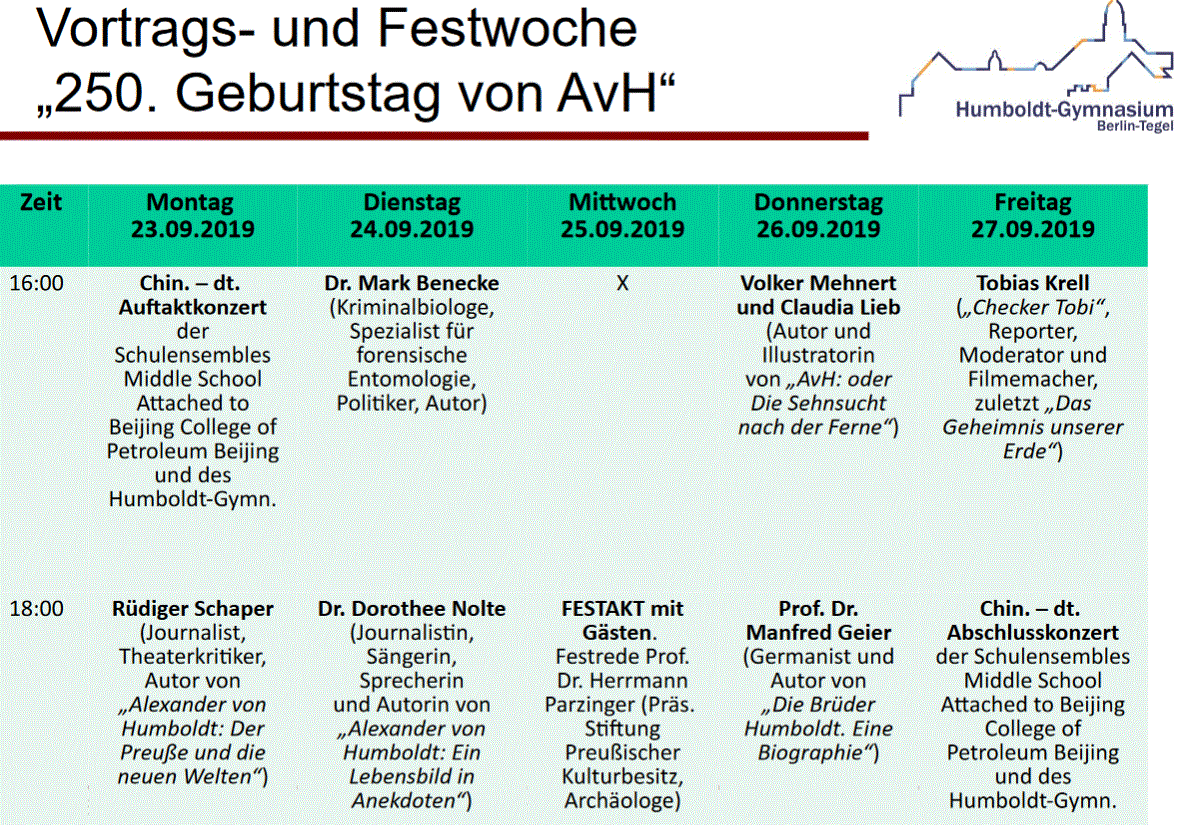Festakt mit Gästen in der Humboldtfestwoche
Am Mittwoch, den 25.09. fand der Festakt mit Gästen statt. Den Festvortrag in der voll besetzen Aula hielt Prof. Dr. Hermann Parzinger, Präsident der Stiftung Preußischer Kulturbesitz und Archäologe. Das weitere Programm wurde vom Humboldt-Chor und -Orchester sowie dem Orchester der Shanghai Foreign Language Middle School gestaltet.
Abschlusskonzert der Humboldtfestwoche
Am Freitag, den 27.09. fand das chinesisch-deutsche Abschlusskonzert des Orchesters der Minhang Foreign Language Middle School Shanghai und der Ensembles des Humboldt-Gymnasiums (Humboldt-Chor, Humboldt-Chor Junior, Orchester und Jazzband) statt.
The proposition’s First Opening Speech on the Repatriation of Cultural Artifacts: “Western museums should agree to repatriate cultural artifacts.”
YES!
Anna-Christina Knauthe: In the past few year lots of archeologists from countries like Greece or Egypt claimed back many artifacts that were removed illegally and are consequently not kept in their country of origin but rather in western museums like the British museum in London or the Neues Museum in Berlin.
We agree with these archeologist as we belief that the artefacts can just be appreciated in the appropriate and adequate when they are in the right context. One example are the Elgin marbles that are displayed in the British museum. The marbles were removed from the Pantheon in 1801 from Elgin and his people and they brought them to the UK without the Greeks knowing that.
These stones got removed from the whole artwork of the pantheon temple and just represent a tiny part of the building over all. Due to that the visitors of the museum will never be able to totally imagine what these marbles actually are and where they belong to. Consequently, they will not notice the marbles as the amazing piece of art that they actually are but rather as some bits of stone. If the British museum gave them back to Greece, they could join the marbles with the pantheon and the total artwork could be admired again. Furthermore, people would be able to see which surrounding the marbles belong to and the impression would be a completely different one.
Furthermore, there are often so many different artifacts in one museum that one is not able to concentrate and look at so many different ones that one ends up walking past them, without appreciating them or even knowing what they are. Therefore, the overload of artifacts in the museum is kind of a waste of artifacts as well. Because let’s be honest, who doesn’t know the feeling when you walked through a museum for hours and all you saw were bits of stone and then you think you have to get to the highlight of the exhibition soon and you enter the great hall and everything you see is just another big piece of stone!
Another point is that the artifacts often lose their value for science too, as they usually only provide all the possible information when they are put in context and put together with other artifacts they belong to. At the most this context is not given when the artifacts are not in their country of origin. Consequently, a lot of knowledge can get lost if they are not repatriated.
A reason to return the properties is that this return would probably increase tourism and, consequently, the economy in this country. As we live in such an international and globalized world, people that flew to London to see the Elgin marbles would fly to Greece or somewhere else too to see the artifacts.
It should be added that due to repatriation, international relationships between countries would be strengthened and that the boundaries would get far less important. That would lead to a greater connectedness and internationality. On the long run, more people would be able to see and admire the artifacts in their original surroundings.
November 2015

